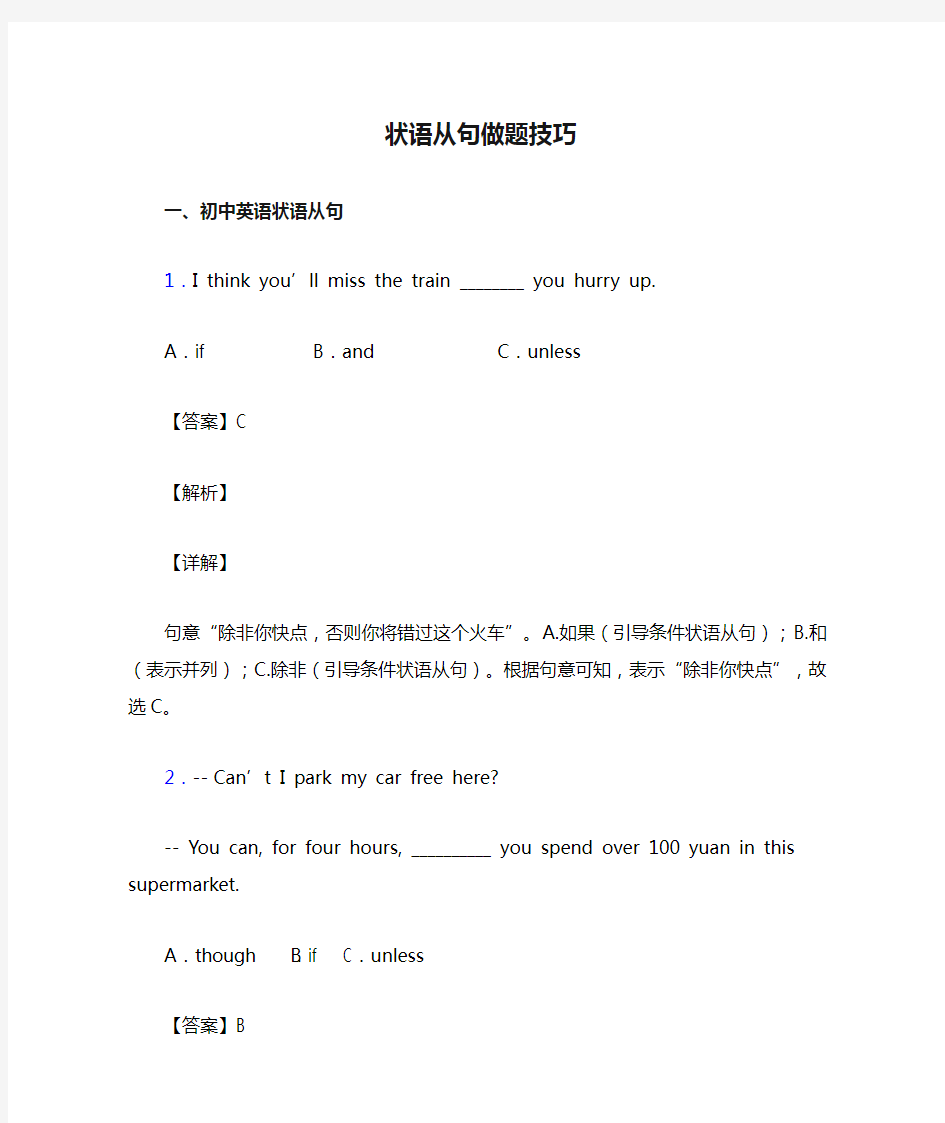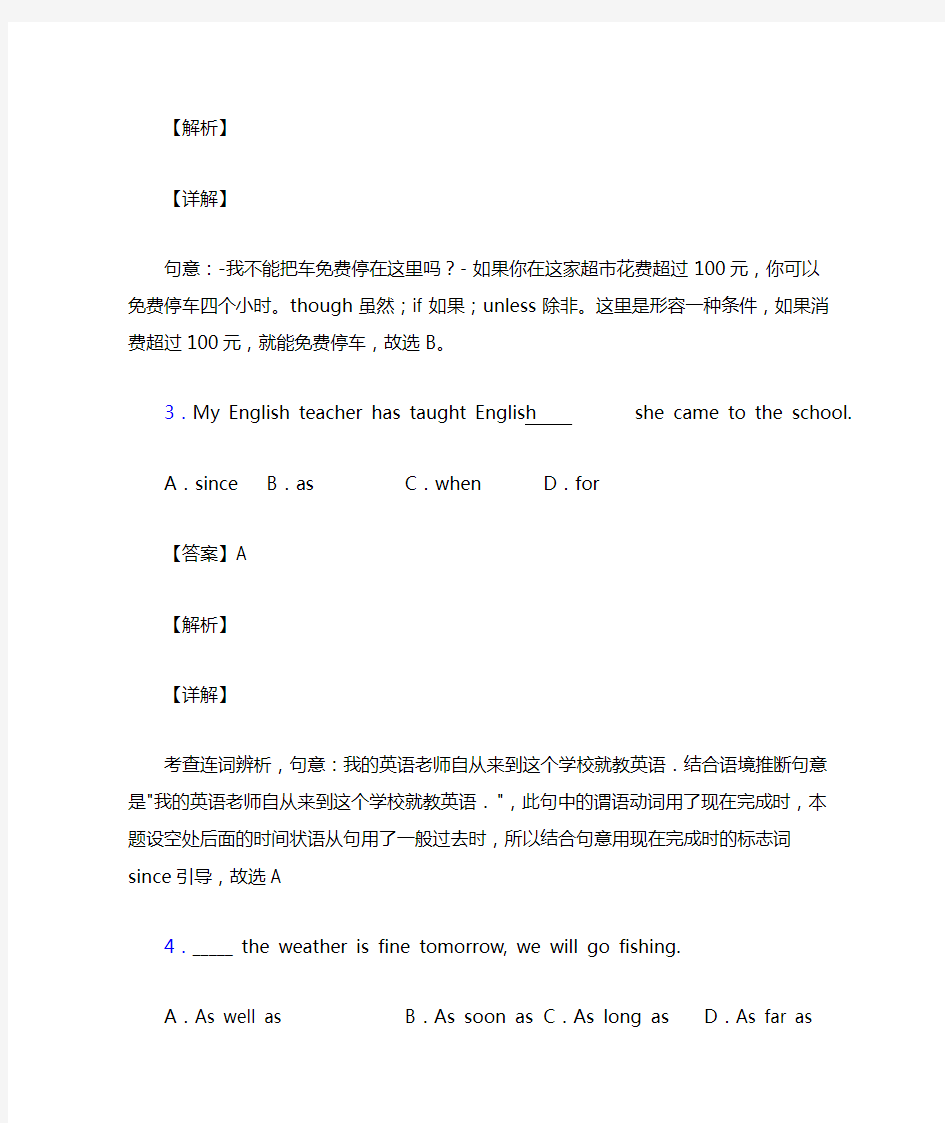

状语从句翻译练习 Practice makes perfect!让我们一起坚持联系,坚持就是胜利! 第一关 1. 他喜欢去有海的地方旅游。 ____________________________________________________________________________________________________ 2. 请把这些书放回原处(它们原来所在的地方)。 ____________________________________________________________________________________________________ 3. 因为昨晚下雨了,所以地面很湿。 ____________________________________________________________________________________________________ 4. 昨晚一定下雨了,因为地面很湿。 ____________________________________________________________________________________________________ 5. 既然大家都明白了,咱们开始吧。 ____________________________________________________________________________________________________ 第二关 6. 孩子们一边唱歌一边跳舞。 ____________________________________________________________________________________________________ 7. 为了能赶上第一班车,他很早就起床了。 _____________________________________________________________________________________________________ 8. 他起床很早,结果赶上了第一班车。 _____________________________________________________________________________________________________ 9. 他立刻关掉电源以防火灾。 _____________________________________________________________________________________________________ 10. 老人气得说不出话来了。 _____________________________________________________________________________________________________ 第三关 11. 天太热,大家都去游泳了。 _____________________________________________________________________________________________________ 12. 假如没有水,会发生什么呢? _____________________________________________________________________________________________________ 13. 我不会其参加那个聚会的,除非受到邀请。 _____________________________________________________________________________________________________ 14. 只要你相信我,我会帮你实现目标的。 _____________________________________________________________________________________________________ 15. 一旦你失去信心,就会失去一切。 _____________________________________________________________________________________________________ 1. They like to go traveling where there is the sea. 2. Put the books where they were. 3. Because it was raining last night, the ground is wet. 4. It must have been raining last night because the ground is wet. 5. Since everyone understands it, let's begin. 6. Children are singing while (they are) dancing. 7. He got up early so that he could catch the first bus. 8. He got up so early that he caught the first bus. 9. He cut off the electricity so that he could prevent the fire from breaking out. 10.The old man was so angry that he couldn't say any words. 11.It was too hot so all went swimming. 12.If there were no water, what would happen? 13.I won't go to the party unless I am invited. 14.If you trust me, I will be able to help you to achieve your goal. 15. Once you lose your confidence, you lose everything. 第四关 16. 孩子虽小,可他很懂事。 17. 即使人人都这么说,我还是不愿相信这是真的。
英语状语从句的汉译 [导读]英语状语从句可分为时间、地点、原因、让步、条件、目的、结果、比较和方式状语从句等。 【摘要】英语状语从句可分为时间、地点、原因、让步、条件、目的、结果、比较和方式状语从句等。有些状语从句的位置比较灵活,有前有后。在英语状语从句的汉译中,我们应注意各类状语从句在英汉两种语言中的位置差异,在译文中适当调整语序,相应地译成符合译文表达习惯的状语从句。 【关键词】英语;状语;从句;汉译;探讨 英语状语从句可分为时间、地点、原因、让步、条件、目的、结果、比较和方式状语从句等。有些状语从句的位置比较灵活,有前有后。此外,英语中各类状语从句都有明显的反映其逻辑关系的连接词。汉语的状语从句与英语的状语从句最大区别就在于状语从句的位置和连接词。一般说来,英语中表示方式、比较和结果等关系的状语从句位于主句之后,其它状语从句的位置比较灵活,可前可后。汉语中多数状语从句是放在主句之前,只有比较和结果状语从句位于主句之后,方式状语从句则可前可后。因此,在翻译状语从句时,无论是英译汉,还是汉译英,我们应注意各类状语从句在英汉两种语言中的位置差异,在译文中适当调整语序,相应地译成符合译文表达习惯的状语从句。其次,应注意连接词,分清主句和从句之间的逻辑关系,尤其是在汉译英时,因为汉语造句多用意合法,一些连接词往往省略。英译汉时,还应注意尽量避免机械地照搬连接词的汉语对应词或译义,在准确理解主句和从句间的逻辑关系后,进行相应的句型转换,如将英语的时间状语从句译为汉语的并列句或条件句,地点状语从句译为汉语的条件句等。汉译英时我们还应注意主语的使用。 一、状语从句前置 英语中的时间、地点、条件、原因等状语从句可前可后,而汉语中的这类状语从句一般前置;英语中表示条件的状语从句一般位于句首,尤其是虚拟条件句,这类条件句常常采用顺译法,将从句置于句首;英语中的让步状语从句前后均可,而汉语则前置为多。Culture shock does not seem like a very helpful experience, when you are going through
状语从句 在复合句中担任状语成分的从句称为状语从句,修饰主句的谓语动词,形容词或副词,状语 说白了就是修饰动作的词或句,也可以理解成修饰谓语的词或句。通常由副词、介词短语、 动词不定式、分词和从句等担当。例如: 1. Naturally, our grandparents were pleased to get our phone call. (副词 ) 2. We worked hard, from sunrise to sunset. (介词状短语 ) 3. To help my disabled aunt, I spend an hour working in her house every day. (不定式 ) 4. Seen from a distance, the farmhouse looked deserted. (过去分词 ) 5. I know how to light a camp fire because I had done it before .(原因状语从句) 状语的位置比较灵活,可以位于句首、句末或句中。enough 用作状语修饰形容词和副词时 必须后置。 状语从句主要用来修饰主句或主句的谓语。一般可分为九大类,分别表示时间、地点、原因、目的、结果、条件、让步、比较和方式。尽管种类较多,但由于状语从句与汉语结构和用法 相似,所以理解和掌握它并不难。状语从句的关键是要掌握引导不同状语从句的常用连接词 和特殊的连接词即考点。现分别列举如下: 1.时间状语从句 常用引导词: when, as, while, as soon as, while, before, after, since , till, until 特殊引导词: the minute, the moment, the second, every time, the day , the instant, immediately , directly, no sooner ? than, hardly ? when, scarcely ? when I didn ’ t realize how special my mother was until I became an adult. While John was watching TV , his wife was cooking. The children ran away from the orchard( 果园 ) the moment they saw the guard. No sooner had I arrived home than it began to rain. Every time I listen to your advice, I get into trouble. When , while, as 都可解释为“当```的时候”但侧重点有所不同。 1) When Eg: When I arrived home , I had a little rest. 注意点: when 从句的主语与主句主语相同,谓语动词是be 动词时,从句主语和be 可以省略。Eg: When (she was) walking along the street, she met her class teacher. 2) As As 除了表示“当```的时候”,还可表示为“一面``` 一面”,“随着” Eg: He sang as he danced.(一面 ```一面 ) You will grow wiser as you grow older.(随着) 3) While 表示“当 ``` 的时候” 强调主句的动作和从句的动作同时发生,从句一般用进行时, 从句动词必须是延续性动词。 Eg: While we were working, they were having a rest. While (they were) having a discussion, they got very confused. 注意点: while 有对比的含义,解释为“然而”。 eg: I prefer black tee, while he likes coffee. 1.until, not ? until 表示“直到 ```才” ,在肯定句中主句常用延续性动词;在否定句中主句常用短暂性动词。
状语从句 状语从句的作用: 状语从句的种类: 状语从句的考点: ?各种状语从句的从属连词有哪些; ?同一种状语从句中从属连词的区别; ?同一个从属连词在多种状语从句中的运用。 一、时间状语从句: 引导词:When, whenever, as, while, before, after, until (till), since, as soon as, once each/every time, next time, the first/…time, the moment, the minute, instantly, immediately, directly(一…就…), no sooner…than, hardly/scarcely…when 考查重点: 1)when的用法:was doing…when, be about to do… when“正在做 某事/正要做….突然发生另一件事”。 2.)几种特殊句型与强调结构的区别: It is + 时刻+ when… It is/has been + 段时+ since(谓语动词一般为过去时)… It will be/was + 段时+ before (现在时/过去时).“过一段时间…才” 3).before的用法: A:表“还未来得及…就…”B:表“过一段时间才…”, 4).until的用法:在not…until结构中,谓语用短暂性动词,“直到…才”;谓语为延续性动词,用until表“一直持续到…”。 5) no sooner…than,hardly/scarcely…when 刚……就 A. 时态:主句用过去完成时(had + pp)从句用一般过去时 B. 倒装:no sooner/hardly/scarcely放句首,主句要倒装 She had no sooner arrived at the station than the train started to move. No sooner had she arrived at the station than …. He had hardly entered the hotel when it began to snow. Hardly had he entered the hotel when it began to snow 二、原因状语从句: 引导词:because, since, as, for, now( that), considering (that), seeing (that) 考查重点:because, since, as, for because—直接原因,非推断.语气最强.回答why since –通常放句首.译为“既然” as–不谈自明的原因,语气最弱. for–放句中,对前面一句话的内容的补充说明。 三、地点状语从句: 引导词:where. Wherever。Where指“在某个地方”,wherever指“无论哪里,在任何一个地方”,在使用时:一要注意两者的含义区别。二要注意状语从句和定语从句的区别。三要注意在状语从句中不可使用介词+which引导。出题者既考状语从句又考定语从句和状语从句的区别。还加入名词性从句这一干扰项。四、目的状语从句和结果状语从句 引导词:in case, so that, in order that, for fear that。So that引导状语从句只能置于主句之后。In order that 引导状语从句可放主句之前或之后。目的状语从句的谓语常含有can,could,may,might情态动词。这也是与结果状语从句的一个区别。引导结果状语从句的连词有:so that,so…that,such…that.结果状语放在主句之后。
状语从句的翻译 例1.When the levels reached 6 percent the crew members would become mentally confused, unable to take measures to preserve their lives. 当含量达到6%时, 飞船上的人员将会神经错乱, 无法采取保护自己生命的措施。(时间状语从句) 例2.When censorship laws are relaxed, dishonest people are given a chance to produce virtually anything in the name of “art”. (83年考题) 当审查放宽时, 招摇撞骗之徒就会有机可乘, 在“艺术”的幌子下炮制出形形色色的东西来。(时间状语从句) 例3.When tables and other materials are included, they should be conveniently placed, so that a student can consult them without turning over too many pages. 当书中列有表格或其他参考资料时, 应当将这些内容编排在适当的位置, 以便使学生在查阅时, 不必翻太多的书页。(时间状语从句) 例4.This happens when a fact is discovered which seems to contradict what the “law” would lead one to expect. 每当发现一个事实使人感到与该定律应得出的预期结论相矛盾的时候, 就发生这种情况。(时间 状语从句) 例5.Now since the assessment of intelligence is a comparative matter we must be sure that the scale with which we are comparing our subjects provides a 'valid' or 'fair' comparison. (92年考题) 既然对智力的评估是比较而言的, 那么我们必须确保, 在对我们的对象进行比较时, 我们所使用的尺度能提供“有效的”或“公平的”比较。(原因状语从句)
英语状语从句的汉译 发表时间:2009-03-18T17:21:44.750Z 来源:《中华现代教育》2009年第1、2期合刊供稿作者:江广华[导读] 英语状语从句可分为时间、地点、原因、让步、条件、目的、结果、比较和方式状语从句等。【摘要】英语状语从句可分为时间、地点、原因、让步、条件、目的、结果、比较和方式状语从句等。有些状语从句的位置比较灵活,有前有后。在英语状语从句的汉译中,我们应注意各类状语从句在英汉两种语言中的位置差异,在译文中适当调整语序,相应地译成符合译 文表达习惯的状语从句。 【关键词】英语;状语;从句;汉译;探讨 英语状语从句可分为时间、地点、原因、让步、条件、目的、结果、比较和方式状语从句等。有些状语从句的位置比较灵活,有前有后。此外,英语中各类状语从句都有明显的反映其逻辑关系的连接词。汉语的状语从句与英语的状语从句最大区别就在于状语从句的位置和连接词。一般说来,英语中表示方式、比较和结果等关系的状语从句位于主句之后,其它状语从句的位置比较灵活,可前可后。汉语中多数状语从句是放在主句之前,只有比较和结果状语从句位于主句之后,方式状语从句则可前可后。因此,在翻译状语从句时,无论是英译汉,还是汉译英,我们应注意各类状语从句在英汉两种语言中的位置差异,在译文中适当调整语序,相应地译成符合译文表达习惯的状语从句。其次,应注意连接词,分清主句和从句之间的逻辑关系,尤其是在汉译英时,因为汉语造句多用意合法,一些连接词往往省略。英译汉时,还应注意尽量避免机械地照搬连接词的汉语对应词或译义,在准确理解主句和从句间的逻辑关系后,进行相应的句型转换,如将英语的时间状语从句译为汉语的并列句或条件句,地点状语从句译为汉语的条件句等。汉译英时我们还应注意主语的使用。 一、状语从句前置 英语中的时间、地点、条件、原因等状语从句可前可后,而汉语中的这类状语从句一般前置;英语中表示条件的状语从句一般位于句首,尤其是虚拟条件句,这类条件句常常采用顺译法,将从句置于句首;英语中的让步状语从句前后均可,而汉语则前置为多。Culture shock does not seem like a very helpful experience, when you are going through its four stages. 当你在经历文化冲击的四个阶段时,它似乎并不是一件有益的事。(时间状语从句) Whenever we go, we must build up good relations with people. 我们不论到什么地方,都要和人们把关系搞好。(地点状语从句)You will fail unless you work hard. 除非你积极工作,不然你总要失败。(条件状语从句) Since we live near the sea, we enjoy a healthy climate. 因为我们住在海滨,所以能享受到有益健康的气候。(原因状语从句)二、状语从句后置 汉语中表原因、时间、条件、让步的从句一般前置,但有时也将它们放在主句后面,此时,从句含有补充说明的作用。英语中表示比较、结果、方式和目的的状语从句汉译时可后置。 Everyone likes you as you are both kind and honest. 人人都喜欢你,因为你既和气,又诚实。(原因状语从句) I had been puzzling over the problem for over an hour without any result, when suddenly solution flashed across my mind. 这个问题把我难住了一个多小时,后来我突然开窍了,找到了答案。(时间状语从句)The sound of thunder nearly always follows the lighting flash although they happen together. 雷声几乎总是跟在闪电后面,尽管它们是同时发生的。(让步状语从句)A rocket must attain a speed of about five miles per second so that it may put a satellite in orbit. 火箭必须获得大约每秒5英里的速度,以便把卫星送入轨道。(目的状语从句) These trees and plants in the sea are so far from the top of the water that no one can see them. 海底的这些树木和植物离水面太远,所以没有人能看见它们。(结果状语从句) He speaks English as if he were an Englishman. 他说起英语来好像一个英国人似的。(方式状语从句) 三、状语从句的转换 有些状语从句从形式上看是某种状语从句,但从其主句和从句的逻辑意义来看,却不属于该种状语从句,而属于另一种从句。此时,汉译时就可根据主句和从句的逻辑意义,进行适当的转换,将其翻译成为另一种句型。如将时间状语从句译为条件句或让步状语从句,地点状语从句译为条件句或结果状语从句等等。 When the molecules of a solid move fast enough, the solid melts and becomes a liquid.(时间状语从句)如果固体内的分子达到一定的运动速度,固体就融化为液体。(条件从句)Why use metal when you can use plastic?(时间状语从句)既然可用塑料,为什么要用金属呢?(让步状语从句)Where there is sound, there must be sound waves.(地点状语从句) 如果有声音,就一定有声波。(条件状语从句) Whatever you fellows are recommending today, you will be sorry about a week from now. (让步状语从句) 不管你们这些人今天提出什么意见,从现在起,你们将有一个星期的日子是难过的。(条件分句)四、省略连词 由于汉语造句采用意合法,汉语的复合句常常省略连词。因此,翻译英语中有些状语从句中的连词时,省略比译出更符合汉语表达习惯。此时从句和主句之间可能成为并列关系,或与主句紧缩为一个句子。He came here in 1985, when he was only a little boy. (时间状语从句)他于1985 年来到这里,那时他还只是一个小男孩。(并列句)
状语从句解题技巧及练习测试题 一、初中英语状语从句 1.--Peter, please send us postcards we’ll know where you have visited. --No problem. A.but B.or C.for D.so 【答案】D 【解析】 句意:——彼得,请给我们及明星片,这样我们将会知道你参观过哪里。——没问题。but 但是,表示转折关系;or或者,表示选择;for为了,表示原因;so所以,表示结果。结合句意,前半句让彼得给我们及明信片,后半句知道彼得到哪里参观了,后一句是前一句的结果,故用连词so。故选D。 2.—I’m going to the post office. —________you are there, can you get me some stamps? A.When B.While C.Because D.If 【答案】B 【解析】 试题分析:A. As 一边…一边,作为 B. While当…时候 C. Because 因为 D. lf假如;句意:我将要去邮局。你去那里的时候,能不能给我带一些邮票呢?故选B 考点:连词 点评:连词在中考中涉及到的很多,尤其在宾语从句、状语从句、定语从句中连词是必考点。平时学习过程中,掌握连词的意思,及所表示的关系是至关重要的,这种关系的判断可以通过句子意思的理解来选择恰到的连词。 3.—Leonardo didn't win an Oscar he acted in The Revenant(荒野求生). 一Yeah. It was hard for him to realize this dream, but he never gave up. A.after B.since C.when D.until 【答案】D 【解析】句意:——列奥纳多直到他在《荒野求生》中才获得奥斯卡奖。——是的。对他来说很难实现这个梦想,但他从不放弃。考查连词辨析题。A. after在……以后;B. since自从……;C. when当……时候;D. until直到……才,多和not连用。本句是时间状语从句,四个选项都可做引导词;根据Leonardo didn't win an Oscar和答语中的but he never gave up.,结合句意结构和语境,可知until符合句意,故选D。 4. 一Last night I went to a concert of Chinese folk music. Erquan Yingyue was so sad but beautiful that I sensed a strong sadness and pain under the beauty. 一So it was. The musician who played it last night to play the erhu since he very young.
目的、结果状语从句 1.这个外国人以手势助说话,这样他就能使听众明白他的意思。(so that) 2.这位退休教师家住的离学校那么远,我们很少能见到他。(so….. that) 3.我说了什么使他竟然对我那么生气?(that) 4.他发音进步很快,英语已经读得非常漂亮。(such… that) 5.大象有强壮的身躯可以为人干重活。(so… that) 6.老师劝我们多带衣服以防天气转冷。(in case) 7.为了不被人轻易认出,这些影星们穿着便装。(in order that) 8.这部有关第一次世界大战的历史小说引人入胜,我简直爱不释手(so… that)。 (上海市高考题) 地点状语从句 1.他在前天掉的地方找到了他的手机。(where) 2.在涉及到公司的利益之处,我们绝不可能轻易放弃。(where) 3.此后无论何时他有机会,他就会同她说话。(whenever) 4.哪儿有病人和苦难,哪儿就有红十字会的工作人员。(wherever)
让步状语从句 1.尽管我承认问题很难,我不同意说它们不能解决。(while) 2.无论我给他们多少忠告,他还是一意孤行。(no matter how) 3.即使我们旅行后很累了,我们仍情绪高昂。(Even if) 4.尽管他喜欢布朗教授的讲课,但不喜欢他的举止。(though) 5.无论你有可能说什么,我都会毫不犹豫地帮助她克服困难。(whatever) 6.这个工人无论怎样努力,他似乎总是不能把工作做得令人满意。(however) 7.不论你是冬天来还是夏天来,你都会觉得这是个居住的好地方。 (whether…or…) 8.不管我何时打电话请求帮助,他都会马上来我家。(whenever) 9.今晚无论是谁来串门,告诉他我不到十点钟是不会回来的。(whoever) 10.虽然并不富裕,但是他对自己的生活相当满意。(Although)(上海市高考题)
一、选择题 1.Mr. White tells us the calls meeting will be cancelled if no agreement _________ tomorrow. A.is reached B.will be reached C.is going to be reached D.has been reached 2.I watched the World Cup in a bar last night and I home 1:00 in the morning. A.go; until B.went; until C.didn’t go; until D.won’t go; until 3.I still have difficulty ________the article________ there are few new words in it. A.to understand; because B.understand ; though C.understanding ; if D.understanding ; though 4.What does she want to do when she ________some money? A.is going to save B.saves C.will save 5.He offered________valuable suggestions ________ few people disagreed. A.such, that B.very, that C.so, that D.too, that 6.I don’t like nuts ________ they are too hard. A.if B.after C.when D.because 7.______ we have different opinions from time to time, we are still good friends. A.Until B.After C.Because D.Though 8.--- What was the party like? --- Wonderful. It’s years ____ I enjoyed myself so much. A.since B.after C.when D.before 9.— What shall we do now? —__________ it’s raining hard, let’s stay at home. A.So B.Since C.Though D.Otherwise 10.Chinese market is________a big one________you should all come and see what it has to offer. A.so, that B.such, that C.enough, that D.too, to 11.一Mom, I took my partner's math book home by mistake. What should I do? 一Well, you should call her you can say sorry to her. A.as if B.so that C.even though D.ever since 12.________ haburgers are junk food, many children still like them. A.If B.Unless C.Because D.Although 13.—Has Jim known the good news? —Not yet. I will tell him about it ________ he comes back. A.while B.until C.as soon as D.since 14.— What should I do if I ______ behind others in my study? — You are going to work really hard to catch up with them.
1. 我常把王海误认为他的双胞胎弟弟,因为他们长得太像了。(mistake) 【答案】 I often mistake Wang Hai for his twin brother because they look so similar / very much alike. 【解析】 这里考查的是because引导的原因状语从句;把...误认为... mistake...for...;长得太像 be very much alike。 2. 如果能找到任何适合你的学习方法,你的学习效率就可能明显提高。(whatever) 【答案】 If you can find whatever learning method (that) suits you your study / learning efficiency is likely to improve remarkably. 【解析】 这里考查的是if引导的条件状语从句;学习效率 learning efficiency;明显提高 improve remarkably,可以用 remarkably表程度。 3. 如果能找到任何适合你的学习方法,你的学习效率就可能明显提高。(whatever) 【答案】 If you can find whatever learning method (that) suits you your study / learning efficiency is likely to improve remarkably. 【解析】 这里考查的是if引导的条件状语从句;学习效率 learning efficiency;明显提高 improve remarkably,可以用 remarkably表程度。
中考英语总复习状语从句解题技巧及练习测试题含答案解析 一、初中英语状语从句 1.She looked behind from time to time ________ she went in the dark. A.when B.as C.while D.before 【答案】B 【解析】 【详解】 句意:她在黑暗中走着,不时回头看看。考查连词辨析。when,while都可表示“…… 时候”;when引导的从句,谓语动词既可以是延续性动词,也可以是非延续性动词;while引导的从句,谓语动词必须是延续性动词,而不能是非延续性动词;as表示“在……期间”“随着”;before“在……之前”,常与过去时,一般现在时等连用。根据句意语境,可知她一边走一边回头看,as切合句意,故选B。 2.—I’m going to the post office. —________you are there, can you get me some stamps? A.When B.While C.Because D.If 【答案】B 【解析】 试题分析:A. As 一边…一边,作为 B. While当…时候 C. Because 因为 D. lf假如;句意:我将要去邮局。你去那里的时候,能不能给我带一些邮票呢?故选B 考点:连词 点评:连词在中考中涉及到的很多,尤其在宾语从句、状语从句、定语从句中连词是必考点。平时学习过程中,掌握连词的意思,及所表示的关系是至关重要的,这种关系的判断可以通过句子意思的理解来选择恰到的连词。 3.— Is everyone here today? — No, Lucy is at home ________ she has got a high fever. A.because B.if C.until D.unless 【答案】A 【解析】 【详解】 句意:——今天大家都到齐了吗?——没有,露西因为发高烧呆在家里了。A. because因为;B. if如果;C. until直到……才;D. unless除非,如果不。露西呆在家里没有来是因为发高烧的原因。故答案为A。 4.—Leonardo didn't win an Oscar he acted in The Revenant(荒野求生). 一Yeah. It was hard for him to realize this dream, but he never gave up. A.after B.since C.when D.until 【答案】D
状语(adverbial)是句子的重要修饰成分。状语是谓语里的另一个附加成分,它附加在谓语中心语的前面,从情况、时间、处所、方式、条件、对象、肯定、否定、范围和程度等方面对谓语中心进行修饰或限制。在英语中,状语修饰动词、形容词、副词等的句子成分。 状语的功用:状语说明地点、时间、原因、目的、结果、条件、方向、程度、方式和伴随状况等。 状语一般由副词、介词短语、分词和分词短语、不定式或相当于副词的词或短语来担当。其位置一般放在句末,但也可放在句首或句中。 副词是一种用来修饰动词,形容词,副词或全句的词,说明时间,地点,程度,方式等概念。 1.副词一般在句子中做状语. He speaks English very well. 他英语说得非常好.中的very是程度副词,用来修饰well。very well是修饰speak的程度状语。 2.不定式在句子中可以作目的状语。 I come specially to see you. 我专门来看你. 3.介词短语 Ten years ago, She bega n to live in Dalia n. 十年前,她开始住在大连。 The boy was praised for his bravery. 4.从句作状语 When she was 12 years old, she bega n to live in Dalia n. If I am not busy tomorrow, I will play football with you. 5.分词作状语 Havi ng had a quarrel with his wife, he left home in a bad temper 。 In hibited in one direct ion, it now seems that the Mississippi is about to take ano ther. 状语简介 概述 状语与定语相同的地方是,都是前者附加成分;不同的地方是,它是谓语里的附加成分,而定语是主语或宾语里的附加成分.从句子的层次上看,状语是在第二个层次和第三个层次里的成分,有时甚至是更低层次的成分.
【英语】英语状语从句(一)解题方法和技巧及练习题 一、初中英语状语从句 1.—Ling ling, you'll feel sleepy tomorrow _______ you go to bed early. —OK, Mom. I’ll go to bed at once. A.if B.unless C.though D.because 【答案】B 【解析】 【详解】 句意:——玲玲,如果你不早点睡觉,明天你会感到困的。——好的,妈妈。我马上去睡觉。 考查连词辨析。A. if如果,引导条件状语从句;B. unless如果不、除非,相当于if not,引导条件状语从句;C. though虽然、尽管,引导让步状语从句;D. because因为,引导原因状语从句。通过分析主从句之间的逻辑关系可知应该选择引导条件状语从句的从属连词if 或unless,再根据句子所表达的含义“如果不早点睡,明天就会感到困”可知unless符合语意,排除if;故答案选B。 2.—I’m going to the post office. —________you are there, can you get me some stamps? A.When B.While C.Because D.If 【答案】B 【解析】 试题分析:A. As 一边…一边,作为 B. While当…时候 C. Because 因为 D. lf假如;句意:我将要去邮局。你去那里的时候,能不能给我带一些邮票呢?故选B 考点:连词 点评:连词在中考中涉及到的很多,尤其在宾语从句、状语从句、定语从句中连词是必考点。平时学习过程中,掌握连词的意思,及所表示的关系是至关重要的,这种关系的判断可以通过句子意思的理解来选择恰到的连词。 3.You'd better get home earlier today we can go out for a big meal. A.in order to B.such that C.so that D.in order 【答案】C 【解析】句意:你最好今天早点回家,这样我们就可以出去吃大餐了。A. in order to 为了,后跟动词原形;B. such that没有此用法;C. so that为了,引导目的状语从句;D. in order+that+从句,引导目的状语从句。we can go out for a big meal表示目的的完整句子,所以使用连词词组so that。故选:C。 4.---Would you like to go bike riding with us tomorrow? ---Sure, ____ I am busy. A.since B.unless C.when D.until 【答案】B